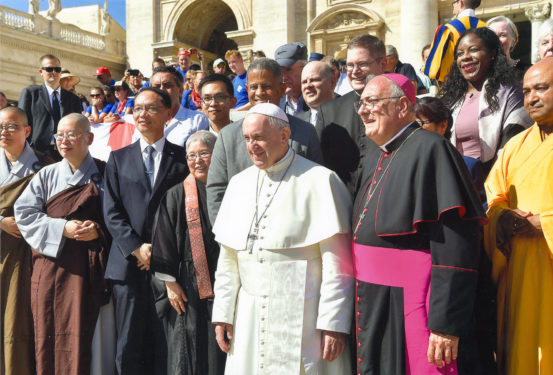My dear brothers and sisters in the Lord,
As I return from my trip to Porto San Giorgio and Rome, I would like to report to you some of the events I took part in the days I was there.
My first stop was Porto San Giorgio, a small town on the Adriatic side of Italy, which is the location of the international headquarters of the Neocatecumenal Way movement. As you know, with the movement, we have established a new Redemptoris Mater Seminary at Douglaston, which already has 12 seminarians.
And following my trip, we will receive three more seminarians. Two of the seminarians who will be coming to the diocese are American born and college ready. One of them will be completing his high school years at Cathedral Prep and the third is Italian born who is university trained but needs a visa to come to the seminary.
These three are good additions to our seminarians. As you know, although we are fortunate to have 48 seminarians studying for the priesthood for Brooklyn and Queens, there are never enough priests to serve our diocese, most especially with our multi-ethnic population.

One unique experience of the three-day event was having the opportunity to interview the candidates who had presented themselves. There were over 240 candidates from all over the world willing to undertake formation for this missionary vocation for the Neocatecumenal Way.
Small groups, one in which I participated, were formed where the candidates were asked some questions. They were asked to describe who they were and when did they feel they had a call to the priesthood. Most importantly, they were asked if they were ready and willing to go to any Redemptoris Mater seminary around the world for a missionary vocation for the New Evangelization.
In responding to these questions, these young men showed great honesty and were so much like our seminarians whom I have interviewed over the years. Most of them do feel unworthy to answer a call to the priesthood. Also, they have a fear of a permanent life commitment. These two aspects seem to be universal aspects of the millennial population that forms the bulk of the new seminarians.
From this gathering, I traveled to Rome to head a delegation of Buddhist and Catholic leaders as part of the “Dialogue of Fraternity Delegation for Green Affordable Housing, USA.”
This project was the idea of the late Cardinal Jean-Louis Tauran, President of the Pontifical Council for Interreligious Dialogue, who died this past July. Our own Auxiliary Bishop James Massa was a member of the consultative board of this Council because of his great experience in interreligious and ecumenical affairs.
Three years ago, Cardinal Tauran asked if some concrete steps could be taken in furthering the dialogue between Catholics and Buddhists. Normally, dialogue is the first step, however, there is then an understanding of our theology and our concept of God and also of theirs. There is also some time for prayer together, and the fourth leg of this table of dialogue is service.
In light of the Encyclical of Pope Francis, “Laudato Si” (On Care for Our Common Home), Cardinal Tauran thought that with the Buddhists and Catholics working together we could come up with green sustainable housing projects aimed at poor senior citizens and those who were homeless or recently homeless.
In fact, when our diocese was asked to respond to the request for proposal we did so through our Catholic Charities housing corporation, Progress of People’s Development Corp. (POP Development), as well as that of the Archdioceses of Los Angeles and Chicago. It was my privilege to represent those two Archbishops in presenting the program to our Holy Father. Several years ago, Pope Francis met with Catholic and Buddhist leaders and gave them his blessing for this wonderful project. There were over 20 people in the delegation as we stood on the steps of St. Peter’s Basilica for a picture with the Pope following the September 12 Audience.
Our Holy Father’s last words to the group – in German-accented English – were “Thank you for your verk!” Pope Francis certainly was hospitable to the delegation and interested in the project. In fact, as soon as I mentioned the name of Cardinal Tauran, the Holy Father pulled from his pocket the memorial prayer card with the picture of the Cardinal.
Certainly, it was clear that he was close to Cardinal Tauran and was more than willing to do what he can to see this project through to fruition.
On this trip to Rome, I was accompanied by Father Patrick Keating, Deputy CEO of Catholic Charities, who is working with Msgr. Alfred LoPinto, CEO, to oversee this project, along with Timothy McManus, Senior VP of Housing Development, who also was a member of our delegation.
Obviously, the situation of the Church Universal today is more than challenging and being in Rome in the midst of these challenging times was an interesting experience.
I was assisted in making contact with the Roman Curia for various issues pending for our diocese with the help of Msgr. Cuong Pham, who currently is assigned to the Pontifical Council for Legislative Texts. Father Keating and I stayed at the North American College during our visit and had the opportunity to interact with Father John Cush, who is academic dean of that college.
Treading across the Atlantic is like putting out over the deep waters that divide the continents. But the universal nature of the Church and the deep faith of its people is just as evident in the United States as elsewhere.
